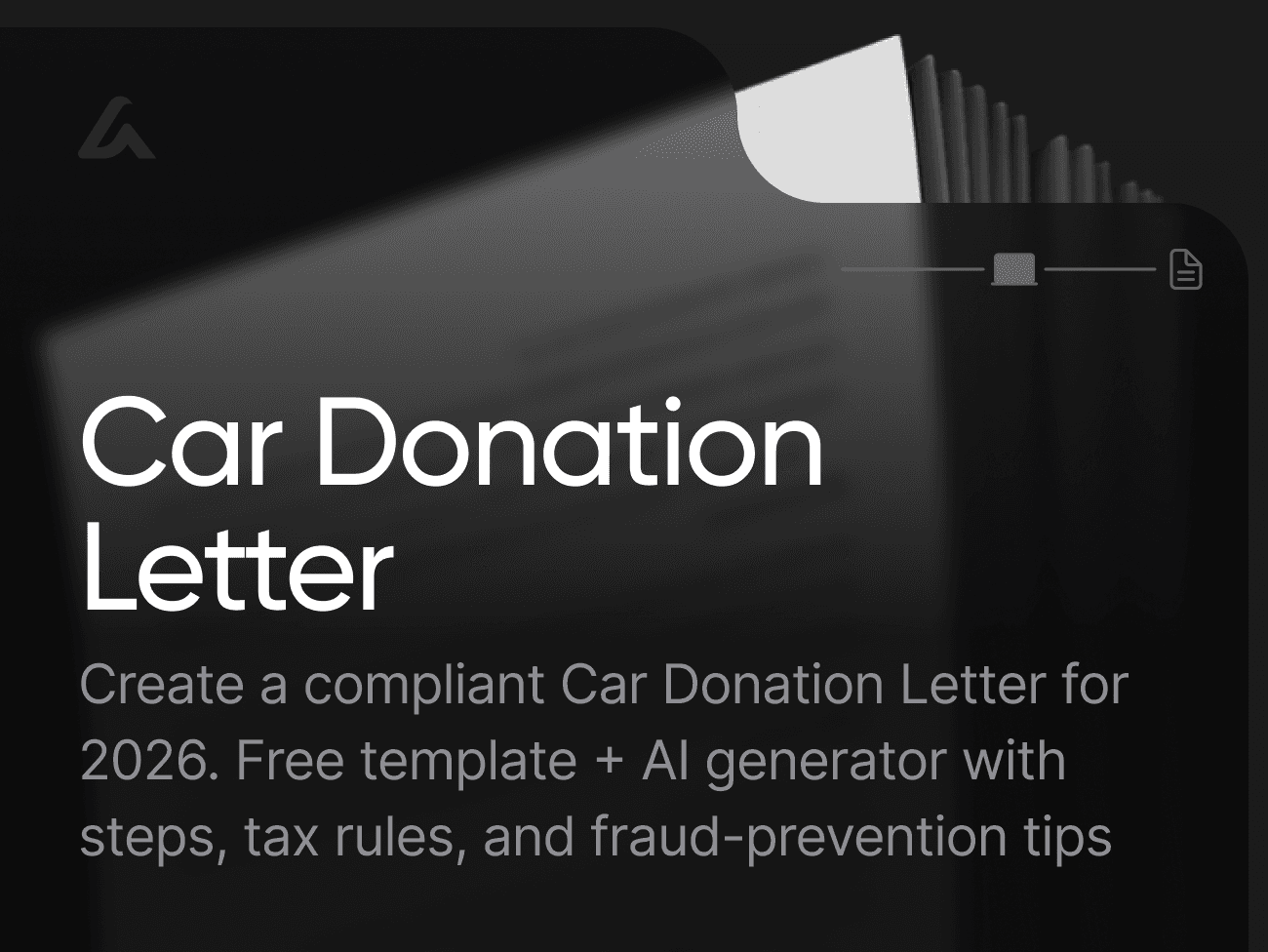AI Lawyer Blog
Car Donation Letter Template (Free Download + AI Generator)

Greg Mitchell | Legal consultant at AI Lawyer
3
A Car Donation Letter is a formal notice to a qualified charity that you intend to donate a motor vehicle, and it documents the key facts the charity needs to acknowledge the gift for tax purposes. The letter typically includes donor and charity details, vehicle information (VIN, make, model, mileage), condition, intended delivery date, and any title or lien information.
In 2024, U.S. charitable giving reached $592.50 billion, underscoring how common documented gifts are across the sector and why clear letters matter for transparency. According to the IRS, vehicle-donation deductions are governed by specific rules — often limiting the deduction to the charity’s gross sale proceeds unless certain exceptions apply.
Download the free Car Donation Letter Template or customize one with our AI Generator, then have a local attorney review before you sign.
You Might Also Like:
Catering Services Agreement Template (Free Download + AI Generator)
Business Letter of Recommendation Template (Free Download + AI Generator)
1. What Is a Car Donation Letter?
A Car Donation Letter is a donor-prepared document that formally records your intent and the essential details of the gift. It signals to the charity that they should be ready to coordinate pickup or drop-off, issue the required written acknowledgment, and handle title transfer or disposal according to law and policy.
While many charities provide their own forms, sending a well-structured letter ensures all facts are on record and that the charity’s eventual receipt matches those details. The letter becomes part of your audit trail alongside the charity’s acknowledgment and any subsequent Form 1098-C (in the U.S.) that may be issued.
2. Why It Matters in 2026?
The compliance environment is tighter and donors face more scrutiny. IRS rules for vehicle donations require proper documentation and often tie your deduction to the charity’s eventual sales price unless the vehicle is significantly used or improved, or otherwise kept for charitable use. Clear letters help charities respond quickly with the correct acknowledgments and reduce back-and-forth.
Digital fundraising has also increased the risk of fraud. U.S. regulators advise donors to research charities, avoid paying by gift cards or wires, and keep records — making your written letter and the charity’s formal reply central to a safe, verifiable donation.
3. Key Components of a Car Donation Letter
Donor and Charity Details: Full legal names, addresses, emails, and phone numbers to ensure accurate acknowledgments.
Vehicle Identification: VIN, make, model, year, approximate mileage, and general condition notes.
Title and Lien Status: Current title holder and any lien release information so the charity can confirm transfer.
Intended Transfer Method: Pickup or delivery, preferred dates, and whether keys, manuals, or spare parts are included.
Donation Purpose: Any donor intent communicated to the charity (e.g., general support) without restricting lawful use.
Tax Acknowledgment Request: Request for the charity’s contemporaneous written acknowledgment and, if applicable, a copy of Form 1098-C after disposition.
Disclosures: Statement that the vehicle is donated “as-is,” with no warranties, and that you understand the deduction depends on statutory rules.
Signature and Date: Wet ink or e-signature acceptable per local law and charity policy.
4. Legal and Tax Requirements by Region
United States: IRS Publication 4303 explains that if the charity sells the car without significant use or material improvement, your deduction is generally limited to the gross proceeds reported on Form 1098-C. If the charity keeps the vehicle for charitable use, you may deduct fair market value subject to documentation. Title transfer and acknowledgment timing are key.
Canada: Donations to registered charities require official receipts; provincial vehicle title rules apply to transfer. Consult CRA guidance on noncash gifts and valuation.
United Kingdom: Gift Aid applies to cash gifts; noncash donations like vehicles may involve sale by the charity and then applying Gift Aid on proceeds if structured correctly. Title and DVLA notifications are critical.
European Union: National rules vary. Ensure transfer of ownership complies with local vehicle registration law and that charity status is recognized for any tax relief.
Always verify local DMV/registration timelines to avoid late-transfer penalties and to remove liability after handover. State rules often specify windows to complete transfer paperwork.
5. How to Customize Your Letter?
Match the charity’s process: If the charity uses a preferred towing vendor or has an intake portal, reference those details in the letter for easy coordination.
Add valuation notes prudently: You may note a guide value for your records, but avoid asserting a fixed deduction — IRS rules may limit it to sale proceeds, and the charity cannot guarantee outcomes.
Clarify contact preferences: Provide daytime phone and email, and authorize the charity or vendor to schedule pickup times.
Attach proof items: Include copies of the title, lien release, maintenance records, or photos to accelerate intake.
Privacy preferences: State whether the charity may publicly acknowledge your gift or if you prefer anonymity.
6. Step-by-Step Guide to Preparing and Sending It
Step 1-Gather documents: Collect the title, any lien release, registration, maintenance records, and a photo of the VIN plate.
Step 2-Confirm charity eligibility: Verify the organization’s tax status and whether it accepts vehicles, then request intake instructions.
Step 3-Write the letter: Include donor/charity info, VIN and vehicle details, intended transfer date/method, and an acknowledgment request.
Step 4-Coordinate logistics: Arrange pickup or delivery; confirm who brings plates, keys, and whether the charity needs a smog or safety check.
Step 5-Transfer title properly: Follow your state or country’s process, remove plates if required, and keep proof of transfer.
Step 6-Obtain acknowledgment: Keep the charity’s contemporaneous written acknowledgment; in the U.S., retain Form 1098-C if the vehicle is sold.
Step 7-Retain records: Store copies of the letter, acknowledgment, pickup receipt, and final documents with your tax files.
7. Tips for Compliance and Fraud Prevention
Research the charity: Use official sources and watchdogs; be cautious of sound-alike names and urgent appeals.
Pay nothing to middlemen: Legitimate charities coordinate towing; avoid requests for gift cards, wires, or cryptocurrency.
Insist on paperwork: Do not hand over keys without a signed pickup receipt and clarity on title transfer.
Protect data: Redact personal info from service receipts you share; keep copies in a secure folder.
Know deduction limits: Your allowable deduction may be the charity’s gross sale price unless exceptions apply.
8. Checklist Before You Send
Charity eligibility verified and willing to accept vehicles.
Letter includes donor, charity, and complete vehicle details (VIN, make, model, year, mileage).
Title and lien release attached or described; transfer steps confirmed.
Pickup or delivery date proposed and contact information provided.
Acknowledgment and Form 1098-C (if applicable) requested.
“As-is” donation language included; signature and date added.
Download the Full Checklist Here
9. Common Mistakes to Avoid
Skipping title transfer steps: Leads to liability for tickets or taxes after the car leaves your driveway.
Assuming fair market value automatically applies: IRS rules may limit the deduction to sale proceeds if the charity sells the car.
Using vague letters: Missing VIN or contact details slows acknowledgments and tax reporting.
Donating to unverified entities: Increases scam risk and may void any tax benefit.
Failing to keep records: Without the charity’s acknowledgment and final docs, deductions may be disallowed.
10. FAQs
Q: Do I need a specific form, or is a letter enough to start a car donation?
A: A clear letter is sufficient to start the process, but many charities will also have an intake form you must complete. Your letter should include the VIN, vehicle details, and proposed transfer date so the charity can schedule pickup and prepare an acknowledgment. Keep copies of your letter, the charity’s reply, and any pickup receipt to complete your records for tax purposes.
Q: How is my U.S. tax deduction determined for a vehicle donation?
A: Under IRS rules, if the charity sells the vehicle without significant use or material improvement, your deduction is generally limited to the charity’s gross sale proceeds reported on Form 1098-C. If the charity keeps the vehicle for charitable use or materially improves it, fair market value may be allowed. Always retain the charity’s contemporaneous written acknowledgment and any 1098-C.
Q: How quickly should I transfer title after donation?
A: Title transfer deadlines vary by state or country. Some U.S. states require transfer within a set number of days, and late fees may apply if you wait too long. Confirm your local rules and ensure the title, lien release, and any required notifications are filed promptly to avoid post-donation liability.
Q: How do I avoid scams when arranging a car donation online?
A: Verify the charity, avoid urgent payment requests, and never pay via gift cards, wire transfers, or cryptocurrency. Use checks or credit cards for any incidental costs if required, and keep receipts. Reputable organizations will provide clear intake steps and written acknowledgments — red flags include pressure, vague documentation, and refusal to provide details.
Q: What records should I keep for my tax file?
A: Keep your donation letter, the charity’s written acknowledgment, pickup or towing receipt, copies of the title and lien release, and any Form 1098-C the charity issues after sale or retention. These documents establish eligibility for any deduction and protect you in case of audit or later questions about ownership and timing.
Sources and References
Charitable giving and donation data are drawn from the Giving USA 2024 Annual Report on Philanthropy reporting total U.S. charitable giving of approximately $592.5 billion.
U.S. tax rules and vehicle donation requirements reference IRS Publication 4303 – A Donor’s Guide to Vehicle Donations, Form 1098-C instructions, and related IRS guidance on contemporaneous written acknowledgments.
Fraud-prevention recommendations align with alerts from the Federal Trade Commission (FTC) and the Internal Revenue Service (IRS) Charity Scams Advisory.
Disclaimer
This article is for informational purposes only and does not constitute legal or tax advice. Laws and tax rules vary by jurisdiction and change over time. Always consult a licensed attorney or tax professional in your area before preparing or relying on a Car Donation Letter.
Get Started Today!
A clear Car Donation Letter speeds logistics, ensures proper acknowledgments, and helps you meet tax requirements while supporting a cause you care about.
Download the free Car Donation Letter Template or customize one with our AI Generator — then have a local attorney review before you sign.
You Might Also Like:



